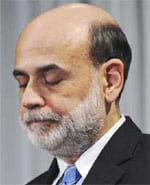GLOBAL FINANCIAL CRISIS
 |
|
Bernanke: Has slashed Fed rate to record lows. |
With fears of inflation being replaced with worries about deflation, analysts are wondering what will come next. With the federal funds rate already trading close to zero, the Fed’s latest rate cut was largely ceremonial and will have little immediate effect on the real economy. The focus is shifting from interest rates to the printing of money, or what is known as quantitative easing. The Fed already has begun purchasing debt outright and inflating its balance sheet.
The European Central Bank, caught flatfooted with its anti-inflation resolve, lowered its interest rate by 75 basis points to 2.5% on December 4, marking the biggest rate cut in the ECB’s decade of existence—but still keeping rates above those in many other developed markets. The same day the Bank of England cut its key rate by a full point to 2%, the lowest level since 1939. Sweden’s Riksbank cut its rate by a larger-than-expected 175 basis points to 2%. A few days earlier Australia lowered its rate by 100 basis points to 4.25%, and New Zealand slashed its rate by 150 basis points to 5%.
Meanwhile, the dollar began to weaken again in December, due in part to year-end squaring of positions by big investors but also reflecting worries that the Fed’s extraordinary liquidity measures and the rapid expansion of its balance sheet could spell trouble for the greenback down the road. The day of reckoning could be postponed by an ongoing shortage of dollars in global money markets (story, page 57), but the US position as a major debtor increases the riskiness of holding dollars for too long after the supply expands.
Gordon Platt



